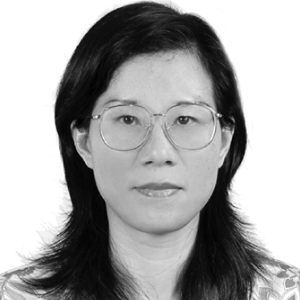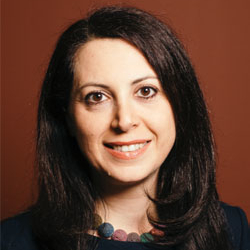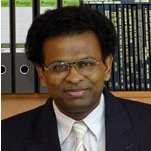COMPUTATIONAL INTELLIGENCE
TECHNICAL PROGRAM COMMITTEE

Gustavo E. Juárez
Gustavo Eduardo Juárez
Gustavo is a Computer Engineer, and has a Master’s degree in Information Systems. He is currently pursuing his PhD in Information Technology at UMA, University of Málaga, Spain. Among his numerous positions in the IEEE, we can mention Chair of the IEEE Council of the Southern Cone, Chair of the IEEE Argentina Section, Chair Ad-hoc Region 9 Vitality Coordinator, Chair of the IEEE Education Society Argentina Chapter, IEEE Student Branch Counselor. He is a categorized researcher III, integrated 4 versatile projects in digital image processing, and directed or co-directed as many others. He was co-director of a project “Digital Information Processing in Digital Instrumentation, Control and Communications”, coordinated the Area of Artificial Intelligence and ICTs of the Project “Science, Technology and Justice” in the global project “Ibero-American Epistemological Perspective of Justice of the International Court of Justice in The Hague. He directed the “Project of Intelligent Navigation of Autonomous Air Systems”, a project of technological and social development PDTS.
He divides his work time between two public universities: at the Universidad Nacional de Tucumán, Artificial Intelligence Laboratory; and at the Universidad Tecnológica Nacional, Facultad Regional Tucumán, Information Systems Engineering Department.
To access his complete CV, click here.
Source IEEE.
|

Cristian R. RiveroCristian Rodríguez Rivero: Lecturer, Ph.D, Electrical&Biomedical Engineer My research is in data science and computational intelligence, and span (Bayesian) machine learning in stochastic control, optimization, time series analysis and forecasting for decision-making, signal processing in time/frequency domain and cognitive dynamic control for non-linear processes with constraints. |
| Chair | Co-Chair |
DISTIGUISHED LECTURERS
|
Keeley Crockett: Professor in Computational Intelligence at The Manchester Metropolitan University. Keeley Crockett is a Reader in Computational Intelligence in the School of Computing, Mathematics and Digital Technology at Manchester Metropolitan University in the UK. She leads the Computational Intelligence Lab that has established a strong international presence in its research into Conversational Agents, sematic similarity measures and machine learning techniques and Adaptive Psychological Profiling. She is currently a member of the IEEE Task Force on Ethical and Social Implications of Computational Intelligence and has a strong focus on ethically aligned design in the context of intelligent systems development. She is also the current Chair for IEEE Computational Intelligence Society Webinars. She is the Principal Investigator (MMU) on the H2020 funded project iBorderCtrl – Intelligent Smart Border Control and a Co-Investigator on the H2020 project PACE (Populism and civic engagement). She is a STEM Ambassador for primary schools, a Mum to Kona and a wife to Craig! |

Pau-Choo ChungPau-Choo Chung Pau-Choo Chung (S’89–M’91–SM’02–F’08) received the Ph.D. degree in electrical engineering from Texas Tech University, USA, in 1991.
(Based on document published on 6 November 2019). Source IEEEXplore. |

Sanaz MostaghimSanaz Mostaghim Sanaz Mostaghim is a professor of computer science and head of SwarmLab at the Otto von Guericke University Magdeburg, Germany. She holds a PhD degree (2004) in electrical engineering from the University of Paderborn, Germany. Sanaz has worked as a postdoctoral fellow at ETH Zurich in Switzerland and as a lecturer at Karlsruhe Institute of Technology (KIT), Germany, where she received her habilitation degree in applied computer science. Her research interests are in the area of evolutionary multi-objective optimization and decision-making, swarm intelligence, and their applications in robotics and science. Sanaz is a member of the executive board of Informatics Germany and the head of the RoboCup team at the University of Magdeburg. She is an active member of IEEE Computational Intelligence Society (CIS) and serves as a member of the CIS Administration Committee. She is associate editor of IEEE Transactions on Evolutionary Computation and member of the editorial board of several international journals. Source WCCI 2020. |
| Distinguished Lecturer | Distinguished Lecturer | Distinguished Lecturer |
|
Ponnuthurai Nagaratnam Suganthan: Dr. at Nanyang Technological University Ponnuthurai Nagaratnam Suganthan (S’90–M’92–SM’00–F’15) received the B.A. degree, the Postgraduate Certificate, and the M.A. degree in electrical and information engineering from the University of Cambridge, U.K., in 1990, 1992, and 1994, respectively. After completing his Ph.D. research in 1995, he served as a Pre-Doctoral Research Assistant with the Department of Electrical Engineering, The University of Sydney, from 1995 to 1996, and as a Lecturer with the Department of Computer Science and Electrical Engineering, University of Queensland, from 1996 to 1999. He moved to Nanyang Technological University in 1999. His research interests include swarm and evolutionary algorithms, pattern recognition, big data, deep learning, combinatorial optimization, and applications of swarm, evolutionary, and machine learning algorithms. He was an elected AdCom Member of the IEEE Computational Intelligence Society from 2014 to 2016. His co-authored paper published in 2009 received the IEEE Transactions on Evolutionary Computation Outstanding Paper Award in 2012. His former Ph.D. student, Dr. J. J. Liang, received the IEEE CIS Outstanding Ph.D. Dissertation Award in 2014. He served as the General Chair of the IEEE SSCI 2013. He is an Editorial Board Member of the Evolutionary Computation Journal (MIT Press). He has been an Associate Editor of the IEEE Transactions on Cybernetics since 2012, the IEEE Transactions on Evolutionary Computation since 2005, Information Sciences (Elsevier) since 2009, Pattern Recognition (Elsevier) since 2001, and the International Journal of Swarm Intelligence Research since 2009. He is a Founding Co-Editor-in-Chief of Swarm and Evolutionary Computation since 2010, an SCI Indexed Elsevier Journal. His SCI indexed publications attracted over 1000 SCI citations in each calendar year 2013, 2014, 2015, 2016, and 2017. He was selected as one of the highly cited researchers by Thomson Reuters in 2015, 2016, and 2017 in computer science. (Based on document published on 8 November 2018). Source IEEEXplore and LinkedIn. |

Witold PedryczWitold Pedrycz (Life Fellow, IEEE) received the M.Sc., Ph.D., and D.Sc. degrees from the Silesian University of Technology, Gliwice, Poland. He is currently a Professor and the Canada Research Chair (CRC-computational intelligence) with the Department of Electrical and Computer Engineering, University of Alberta, Edmonton, AB, Canada. He is also with the Systems Research Institute, Polish Academy of Sciences, Warsaw, Poland. He has published numerous articles in these areas. His main research interests include computational intelligence, fuzzy modeling and granular computing, knowledge discovery and data mining, fuzzy control, pattern recognition, knowledge-based neural networks, relational computing, and software engineering. He is a member of a number of editorial boards of other international journals. He is intensively involved in editorial activities. He is an Editor-in-Chief of Information Sciences. He currently serves as an Associate Editor for the IEEE Transactions on Fuzzy Systems. (Based on document published on 4 November 2020). |
| Distinguished Lecturer | Distinguished Lecturer |
DESCRIPTION
Computational Intelligence (CI) is the theory, design, application and development of computational paradigms that are biologically and linguistically motivated. Traditionally, the three main pillars of IC have been neural networks, diffuse systems and evolutionary computing. However, over time many computer paradigms inspired by nature have evolved. Therefore, IC is an evolving field, and today, in addition to the three main components, it encompasses computer paradigms such as environmental intelligence, artificial life, cultural learning, artificial endocrine networks, social reasoning and social networks. artificial hormones IC plays an important role in the development of successful intelligent systems, including games and cognitive development systems. In recent years there has been an explosion in the deep learning research field, particularly deep convolutional neural networks. Today, deep learning has become the central method for artificial intelligence. In fact, some of the most successful Artificial Intelligence systems are based on Computational Intelligence.
| SUGGESTED SUBTOPICS |
| For this topic, the following subtopics are suggested. Please note that you may send your paper beyond the scope of this list. In such a case, you must specify, in submission web form, the new subtopic that you consider your paper belongs to, as per instructions in Tutorial for Paper Submissions., under the paragraph How to specify a subtopic that is not predefined. |
- Computer Vision
- Deep Learning
- Extreme Learning
- Genetic Algorithms
- Natural Language Processing
- Neural and Learning Systems
- Swarm Intelligence
ACCEPTED PAPERS
| ID | Título (Title) | Autor (Author) | Programa (Track) |
|---|---|---|---|
| 13 | Conversational Agent for Customer Service in Social Networks | Rodriguez, Guillermo • Ibánez, Leonardo | COMPUTATIONAL INTELLIGENCE |
| 19 | Automatic allocation of classrooms at the Universidad Nacional del Chaco Austral through the application of genetic algorithms with niche methods | Andreu, Ruben E | COMPUTATIONAL INTELLIGENCE |
| 28 | User Stories identification in software's issues records using natural language processing | Pena, Francisco J • Roldán, Luciana • Vegetti, Marcela | COMPUTATIONAL INTELLIGENCE |
| 33 | Industrial Symbiosis: Context-Aware Strategies for Automated Negotiation of Smart Contracts in Peer-to-Peer Markets of Prosumers | Kröhling, Dan E. • Martínez, Ernesto | COMPUTATIONAL INTELLIGENCE |
| 60 | Process for Evaluation of STEAM Activities | Lopez De Luise, Daniela • Ruiz Tabarez, Erica Andrea | COMPUTATIONAL INTELLIGENCE |
| 72 | Chatbots: Autoexpansion Approach to Improve Natural Language Automatic Dialogs | Lopez De Luise, Daniela • Pascal, Andrés • Santa Cruz, Juan Manuel • Pankrac Gurin, Carlos • Alvarez, Claudia | COMPUTATIONAL INTELLIGENCE |
| 73 | Data Mining for Presition Rice Crops: Risk Modeling and Parameters | Lopez De Luise, Daniela • Ledesma, Ernesto • Bel, Walter • Velazquez, Eduardo • Pirchi, Hector | COMPUTATIONAL INTELLIGENCE |
| 76 | A Memetic Cellular Genetic Algorithm for Multiple Sequence Alignment | Rojas, Matias Gabriel • Carballido, Jessica Andrea • Olivera, Ana Carolina • Vidal, Pablo Javier | COMPUTATIONAL INTELLIGENCE |
| 90 | A data-driven approach to weather forecast using convolutional neural networks | Micolini, Orlando • Ventre, Luis O • Martina, Agustín • Ayme, Rubén E. • Ortmann, Nesto J. • Trejo, Bruno G. | COMPUTATIONAL INTELLIGENCE |
| 123 | Performance Evaluation For Identifying Best Feature Selector And Machine Learning Algorithm For Optimizing Crop Recommendation System | Janrao, Surekha Ravindra • Shah, Deven | COMPUTATIONAL INTELLIGENCE |
| 135 | Model Free DEAP Controller Learned by Reinforcement Learning DDPG Algorithm | Bernat, Jakub • Apanasiewicz, Dawid | COMPUTATIONAL INTELLIGENCE |
| 214 | Analysis of Professional Skills Using Growing Hierarchical Self-Organizing Map | Almeida, Ricardo • Fernandes, Bruno • Barros, Pablo | COMPUTATIONAL INTELLIGENCE |
| 244 | Fuzzy Approach for Emotion Recognition in Music | Ospitia, Yesid • Baldassarri, Sandra • Sanz, Cecilia • Beltrán, José Ramón • Olivas, Jose A. | COMPUTATIONAL INTELLIGENCE |
| 246 | A preliminary model for the recommendation of items based on textual summaries | Coelho, Gonzalo • Monteserin, Ariel • Schiaffino, Silvia • Díaz Pace, Andrés | COMPUTATIONAL INTELLIGENCE |
| 248 | Detecting Moving Packages on a Conveyor Belt Using Computer Vision | Yuan, Rebeca • Jaime, Ibrahim • Chiabrando, Bruno • Redolfi, Javier Andrés | COMPUTATIONAL INTELLIGENCE |
| 280 | Towards an Attention Mechanism LSTM Framework for Human Action Recognition in Videos | Orozco, Carlos I • Buemi, María Elena • Berlles, Julio Jacobo | COMPUTATIONAL INTELLIGENCE |
| 329 | Contractive Method for identification of Nonlinear Regressors in Dynamic Systems. | Rodrigo, Rodolfo H. • Patino, Héctor D • Schweickardt, Gustavo | COMPUTATIONAL INTELLIGENCE |
| 336 | Towards Robust Perception Depth Information For Collision Avoidance | Saleh, Shadi • Manoharan, Shanmugapriyan • Nine, Julkar • Hardt, Wolfram | COMPUTATIONAL INTELLIGENCE |
| 337 | On Machine Learning Methods for Genome Enabled Prediction of Complex Phenotypes | Hounie, Ignacio • Elenter, Juan • Etchebarne, Guillermo | COMPUTATIONAL INTELLIGENCE |


